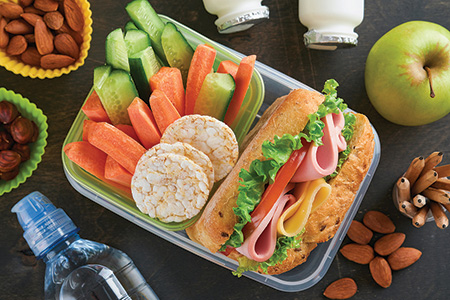From Memorial Health System

By Dr. Kerry Scott
Time is of the essence when it comes to raising kids, but there never seems to be enough. If you aim to provide nutritious, healthy lunches your family will love, Memorial Health System Culinary Medicine and Family Medicine Specialist Dr. Kerry Scott is here to help.
Dr. Scott is a certified culinary medicine specialist (CCMS) with a deep knowledge of nutrition and culinary techniques to prepare food that is consistent with real-world budgets and time constraints. He is board certified in family medicine and osteopathic manipulative treatment.
Here are some of his recommendations:
LIMIT SNACKING
According to Scott, “It is important to incorporate as many healthy food options into children’s meal plans as possible. Many children are picky eaters and enjoy snacks more than balanced meals. Processed snack items have been manufactured to taste good and marketed to appeal to children. Since these snacks have been processed, they are made with added sugars and salt to appeal to the taste buds. Added sugars can lead to weight gain and obesity, especially in children who are not physically active. High salt intake can lead to early hypertension in children.”
Some examples of unhealthy snacks that should be avoided include:
- Packed fruit snacks/gummies
- Soda
- Fruit juice/boxed juices
- Sugary cereals
- Pop Tarts
- Packaged lunch box meals
- Flavored yogurt
- Energy bars and drinks
- Hot dogs
- Fast food
- Frozen chicken nuggets/dinners
- Boxed macaroni and cheese
- Chips
- Candy
SIMPLE VS. COMPLEX SUGARS
A major health concern for children is obesity.
“The obesity rate for young children continues to increase each year, and these children are at risk of developing chronic health conditions such as diabetes, heart disease, fatty liver disease and early degenerative joint disease,” Scott says. “Not all sugar is bad, but sugar in excess is dangerous.”
He adds, “Simple sugars are naturally occurring sugars found in fruits, vegetables and honey, and added sugars (can be found) in candy, jams, jellies, etc. These sugars can cause spikes in blood sugar levels when eaten, increasing the risk over time to the development of insulin resistance and diabetes.”
Limit simple sugars when possible, and opt for complex sugars instead. Beans, whole grains, oats, popcorn and starchy vegetables include complex sugars. The sugars in these foods break down slowly and do not cause unwanted spikes in blood sugar levels.
BRAIN-BOOSTING FOODS
The food we eat can improve health in many ways. Some foods even help with brain function and concentration, which is vital to success in school.
“Some healthy foods that may help boost brain function and concentration include fatty fish (salmon, tuna, mackerel), blueberries, broccoli, dark chocolate, eggs, and nuts,” Scott says.
By prioritizing nutritious choices, avoiding sugary snacks and incorporating brain-boosting foods, you’ll be fostering your family’s wellbeing and setting them up for success. For healthy lunch recipes and ideas, visit Health Meets Food (https:// culinarymedicine.org/community-class-recipes/lunch-recipes/).
Memorial offers both primary care services and virtual visits. Learn more by visiting wearememorial.com or by calling (228) 867-5000.


